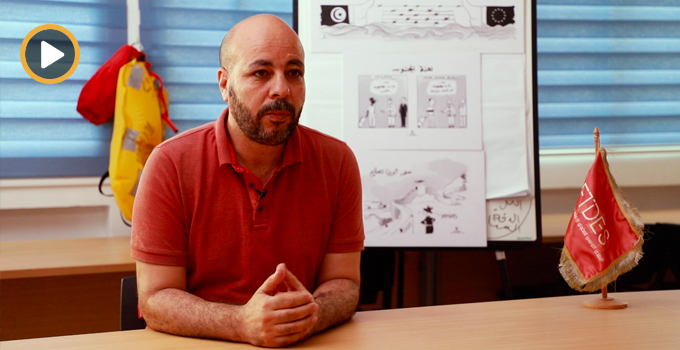ext of report by Christophe Ayad headlined: “Gafsa: Dangerous Ground for Ben Ali“, published by French centre-left daily newspaper Liberation website on 2 August; subheadings are as published:
Tunisia: Harsh repression has fallen upon this region; a symbol of the regime’s flaws.
The Gafsa region has been in turmoil for the past seven months now. This poor mining region located in the far reaches of the border with Algeria has become the longest ongoing centre of protest since President Zine El-Abidine Ben Ali (who is running for a fifth term in office) came to power in 1987. On Friday, 25 July, the city of Redyef, the epicentre of the protest, was the scene of a new demonstration that was dispersed without further ado by public order forces and followed by the arrest of four new association and union leaders, including Zakia Dhifaoui. This teacher and Democratic Forum for Work and Freedoms [FDTL] militant was arrested by undercover policemen at the home of Jomaa Hajji, the wife of Adnan Hajji, the protest movement’s leader in the Gafsa region who has also been imprisoned since 22 June. Sunday’s protest march assembled at least 500 persons who are close to the detainees.
Favoured
The Redeyef revolt began on 5 January when the management of the Gafsa Phosphates Company posted the names of newly hired employees. Unemployment is particularly high, especially among young graduates, and waves of employment [opportunities] are rare. There was an outburst of anger when the inhabitants discovered that the children of the company’s executives, who are also members of the UGTT labour union federation that is under tight government control, had been favoured. This was all the more so since, in a region with strong tribal traditions, the union’s regional bodies are controlled by people who come from Tunis and the remainder of the country and not by “locals”. Public order forces were initially overwhelmed and reacted even more harshly. To everyone’s surprise however, the inhabitants did not give in. Women and children took to the streets at the end of January to get the imprisoned men released. In view of the movement, which has spread to the entire Gafsa mining area (Oum, Larayes, Metlaoui, Feriana, etc.), several families have gone to live in the mountains and even in nearby Algeria to escape the repression. The region has been subjected to a quasi-permanent encirclement since the month of March. Vehicles are checked when entering and leaving the region.
There has been constant escalation; interspersed with pauses. The police fired real bullets on 6 June, killing a demonstrator and wounding 26 others. The army was sent to the region in June because of the police’s inability to contain the demonstrations.
Elections
The truth is that the government fears, above all, the spread of this social and political conflict to the rest of the country.
The Gafsa revolt alone epitomizes Tunisia’s many ills: youth unemployment, extreme poverty in the peripheral regions of the country, nepotism, government infiltration of labour union organizations, a lack of any room for free expression and representation (both labour union as well as political), and finally a security approach to all protests. Strangely however, until now, the Gafsa miners’ cause has hardly mobilized the opposition and human rights militants in Tunis, who are more focused on next year’s presidential and legislative elections, whose outcomes are predetermined.
The best proof of the government’s refusal to engage in any kind of dialogue or negotiations is that all the leaders of the Gafsa protest movement have been arrested (when they are not on the run) and are about to be tried. This is true for Adnan Hajji, the leader of the movement, as well as Tayeb Ben Othman and Bechir Laabadi.
According to a list of names drawn up by human rights militants, at least 190 people have been locked up. Only a minority of these people have been tried and condemned to serve sentences of two months to three years in prison. There have been reports of several cases of torture during detention. However, much heavier sentences could strike the movement’s “heads.” Hajji, who had gone underground, is accused of “forming a criminal gang, conspiracy to harm persons and public property, and rebellion.” He could get 20 years in prison.
The government unsuccessfully attempted an overture in mid July. The mining company’s CEO was fired for “incompetence” and President Ben Ali promised a major investment plan for this underdeveloped region. It will take more than this – and most of all more concrete advances – to restore the shredded trust between the inhabitants of the Gafsa region and the government in Tunis.
Originally published by Liberation website, Paris, in French 2 Aug 08.
(c) 2008 BBC Monitoring Middle East. Provided by ProQuest Information and Learning. All rights Reserved.tracking
Story Source: BBC Monitoring Middle East




iThere are no comments
Add yours